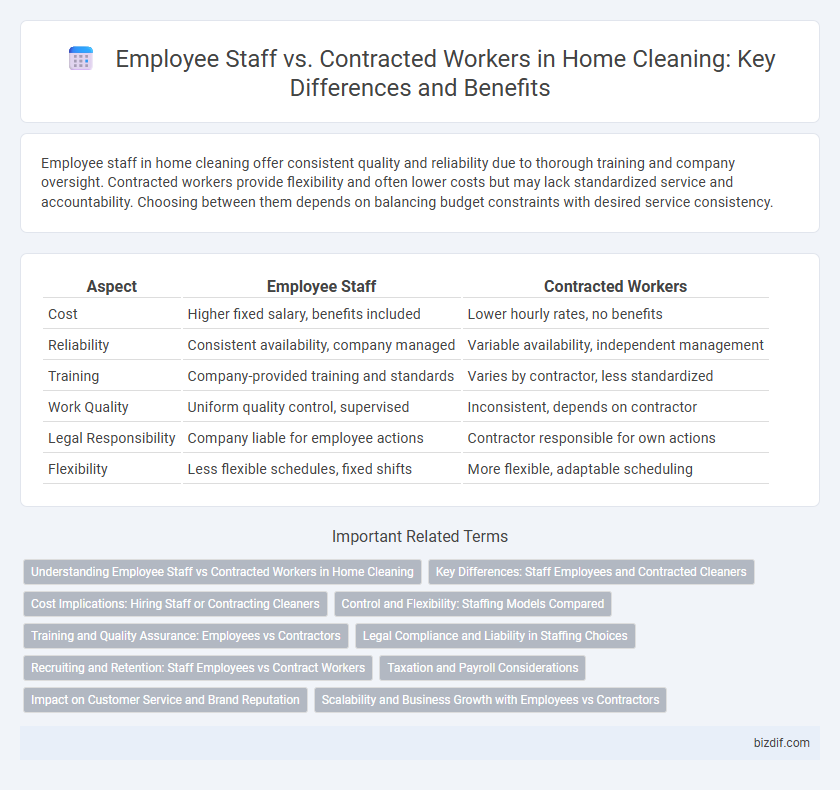Employee staff in home cleaning offer consistent quality and reliability due to thorough training and company oversight. Contracted workers provide flexibility and often lower costs but may lack standardized service and accountability. Choosing between them depends on balancing budget constraints with desired service consistency.
Table of Comparison
| Aspect | Employee Staff | Contracted Workers |
|---|---|---|
| Cost | Higher fixed salary, benefits included | Lower hourly rates, no benefits |
| Reliability | Consistent availability, company managed | Variable availability, independent management |
| Training | Company-provided training and standards | Varies by contractor, less standardized |
| Work Quality | Uniform quality control, supervised | Inconsistent, depends on contractor |
| Legal Responsibility | Company liable for employee actions | Contractor responsible for own actions |
| Flexibility | Less flexible schedules, fixed shifts | More flexible, adaptable scheduling |
Understanding Employee Staff vs Contracted Workers in Home Cleaning
Employee staff in home cleaning typically work under direct supervision with fixed schedules, consistent wages, and benefits like health insurance, ensuring accountability and quality control. Contracted workers operate as independent entities, offering flexibility and specialized services but often lack benefits and job security, affecting long-term reliability. Choosing between employee staff and contracted workers depends on factors such as cost efficiency, quality assurance, and legal responsibilities within the home cleaning industry.
Key Differences: Staff Employees and Contracted Cleaners
Staff employees in home cleaning typically receive regular wages, benefits, and training provided directly by the cleaning company, ensuring consistency and accountability. Contracted cleaners operate as independent agents who manage their schedules and expenses but lack company-provided benefits and direct supervision. The key differences lie in employment status, control over work processes, and legal responsibilities, affecting cost, quality, and liability for homeowners and cleaning service providers.
Cost Implications: Hiring Staff or Contracting Cleaners
Hiring in-house cleaning staff involves fixed costs such as salaries, benefits, training, and equipment, resulting in higher long-term financial commitment for home cleaning services. Contracted cleaners offer cost flexibility, with expenses based on service usage and fewer overheads, making it a budget-friendly option for irregular cleaning needs. Evaluating the frequency, quality control, and total expenditure helps determine the most cost-effective approach between employee staff and contracted workers.
Control and Flexibility: Staffing Models Compared
Employee staff in home cleaning services provide greater control over scheduling, quality assurance, and company culture, as they are directly managed and trained by the hiring business. Contracted workers offer increased flexibility, allowing businesses to scale labor quickly based on demand without the obligations of employee benefits or long-term commitments. Balancing control with operational agility depends on whether a cleaning company prioritizes consistent service standards or adaptable workforce management.
Training and Quality Assurance: Employees vs Contractors
Employees undergo comprehensive training programs focused on consistent cleaning techniques and safety standards, ensuring quality assurance through regular performance evaluations. Contracted workers often receive varied training depending on the third-party agency, which can result in inconsistent service quality and less direct oversight. Establishing uniform quality assurance protocols is typically more effective with employee staff, leading to higher client satisfaction and reliability in home cleaning services.
Legal Compliance and Liability in Staffing Choices
Employing in-house cleaning staff requires adherence to labor laws, including minimum wage, benefits, and workplace safety regulations, ensuring full legal compliance and minimizing liability risks for the business. Contracted workers, often classified as independent contractors, transfer many legal responsibilities to the contracting agency, but misclassification can lead to significant penalties and liability issues. Careful evaluation of employment status and compliance with the Fair Labor Standards Act (FLSA) and IRS guidelines is essential for mitigating legal risks in staffing decisions.
Recruiting and Retention: Staff Employees vs Contract Workers
Recruiting staff employees in home cleaning often yields higher retention rates due to consistent work schedules and benefits like healthcare and paid leave, which foster loyalty and reduce turnover. Contracted workers provide flexibility and lower immediate costs but typically require ongoing recruitment efforts, as they lack long-term incentives to stay with one company. Companies focused on building a reliable cleaning team prioritize hiring staff employees to enhance service quality and maintain client satisfaction through experienced, stable personnel.
Taxation and Payroll Considerations
Employing staff for home cleaning services requires managing payroll taxes, including Social Security, Medicare, and unemployment taxes, with the employer responsible for tax withholding and reporting. Contracted workers, classified as independent contractors, handle their own tax obligations, shifting payroll tax liabilities away from the homeowner but necessitating accurate classification to avoid IRS penalties. Proper distinction between employee staff and contracted workers is crucial for compliance with tax laws and minimizing risks related to payroll audits and misclassification fines.
Impact on Customer Service and Brand Reputation
Employee staff in home cleaning services often deliver more consistent customer service and foster stronger brand loyalty due to their thorough training and long-term commitment. Contracted workers may provide flexible labor but risk variability in service quality, potentially damaging customer trust and overall brand reputation. Maintaining a dedicated employee workforce enhances accountability and ensures higher standards, directly benefiting the brand's image and customer satisfaction.
Scalability and Business Growth with Employees vs Contractors
Employing in-house cleaning staff facilitates greater control over training quality and consistency, directly supporting scalable business growth through standardized service delivery. Contracted workers offer flexibility for fluctuating workloads but may introduce variability that can hinder long-term brand reliability and client retention. Businesses aiming for sustained expansion often benefit from investing in dedicated employee teams to optimize operational efficiency and foster strong customer relationships.
Employee staff vs Contracted workers Infographic

 bizdif.com
bizdif.com